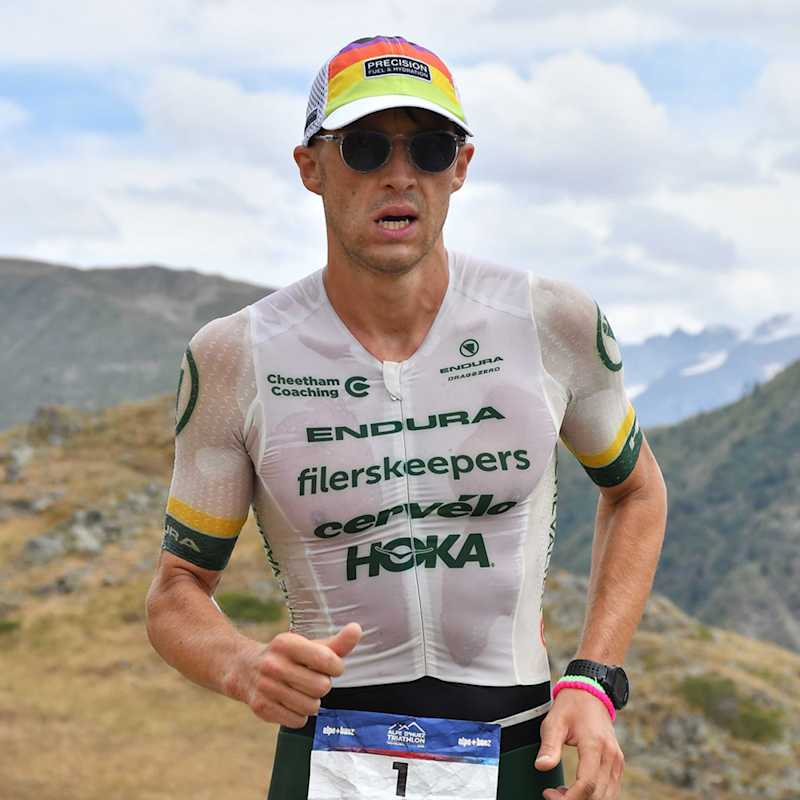
Leon Chevalier
IRONMAN 70.3® Les Sables D'Olonne
Leon's headline numbers
Leon's strategy
Fueling
Carbohydrate is the main fuel you burn when racing. Failing to fuel properly is a leading cause of underperformance in longer races.
As evidenced in Leon’s case studies, his middle and long-distance triathlon fueling strategies are usually made up of over-concentrated drink mixes on the bike. Although this may not suit every athlete, it’s common for professionals to use this in their fueling strategy to save valuable time and effort opening products such as gels and chews. To be able to use these mixes successfully, athletes undergo vast amounts of gut training to become accustomed to the specific concentrations in their bottles before they use them on race day. The significant difference in his carb intake compared with his previous 70.3 races was a result of a dropped bottle, which meant he was 120g down on his initial pre-race plan. In an attempt to make up for this loss, Leon picked up two on-course energy gels, each containing 25g of carb. Despite his overall carb intake equalling more than 90g/h, Leon mentioned ‘feeling low’ on the run, likely due to both the physiological and psychological impact of dropping a bottle and ‘losing’ some carbs he had otherwise accounted for.
Hydration
Taking on board an appropriate amount of fluid and sodium is essential to maintaining blood volume and supporting the cardiovascular effort needed to perform on race day.
Whilst the absolute amount of sodium and fluid consumed per hour is important, it’s critical to consider these in relation to each other. This is known as 'relative sodium concentration' and it’s expressed in milligrams per litre (mg/L). How much sodium you’re taking in per litre of fluid is more important than the absolute amount taken in per hour.
Sweat sodium concentration (mg/L) is largely genetically determined and remains relatively stable. Knowing how salty your sweat is enables you to replace a good proportion of your sweat losses, which can range from 200-2,000mg/L.
Given Leon’s losses are High (1,392mg/L), nailing his hydration strategy remains important, even when it’s Mild.
Learn moreAs previously mentioned, Leon dropped one of his 1L (32oz) bottles at the very start of the bike leg containing ~1000mg of sodium. He was able to pick up ~750ml (24oz) of plain water to make up for some of the fluid he lost, but he still felt this wasn’t enough to mitigate his sweat fluid losses. In an attempt to get back on top of this, Leon picked up a further ~500ml (16oz) of plain water from the aid stations across the duration of the run, summing to the highest fluid volume we’ve seen him drink whilst running in a 70.3®. However, he wasn’t able to replace the ~1000mg of sodium from the dropped bottle, resulting in his relative sodium concentration being lower than we usually see. In these mild conditions, this hydration strategy was likely adequate for Leon as he reported no issues except feeling thirsty on the bike. If the race was hotter or any longer, he may have begun to experience the effects of dehydration or possibly cramping and should aim to have a backup plan for his future races to prevent this.
Caffeine
Beyond the Three Levers of Performance (carb, sodium and fluid), caffeine is one of only a few substances that is proven to improve performance for most endurance athletes as it can help stave off mental and physical fatigue.
Whilst above the general caffeine recommendations of 3-6mg/kg, as an athlete with a high tolerance for caffeine, this amount will have kept Leon’s blood caffeine levels high throughout the race, increasing his perceived energy levels and supporting his performance.
How Leon hit his numbers
Here's everything that Leon ate and drank on the day...
Leon's weapons of choice
Final thoughts
Leon's full stats
Data Confidence?
There is good confidence in the accuracy of the data reported. An athlete feels that the numbers closely reflect what they consumed despite a couple of estimations which may carry some degree of error. The majority of what was consumed is recorded to a high level of specificity (most volumes are known through the use of bottles brands quantities flavours). The numbers are very plausible and align with previous data recordings (if an athlete has collected data previously).